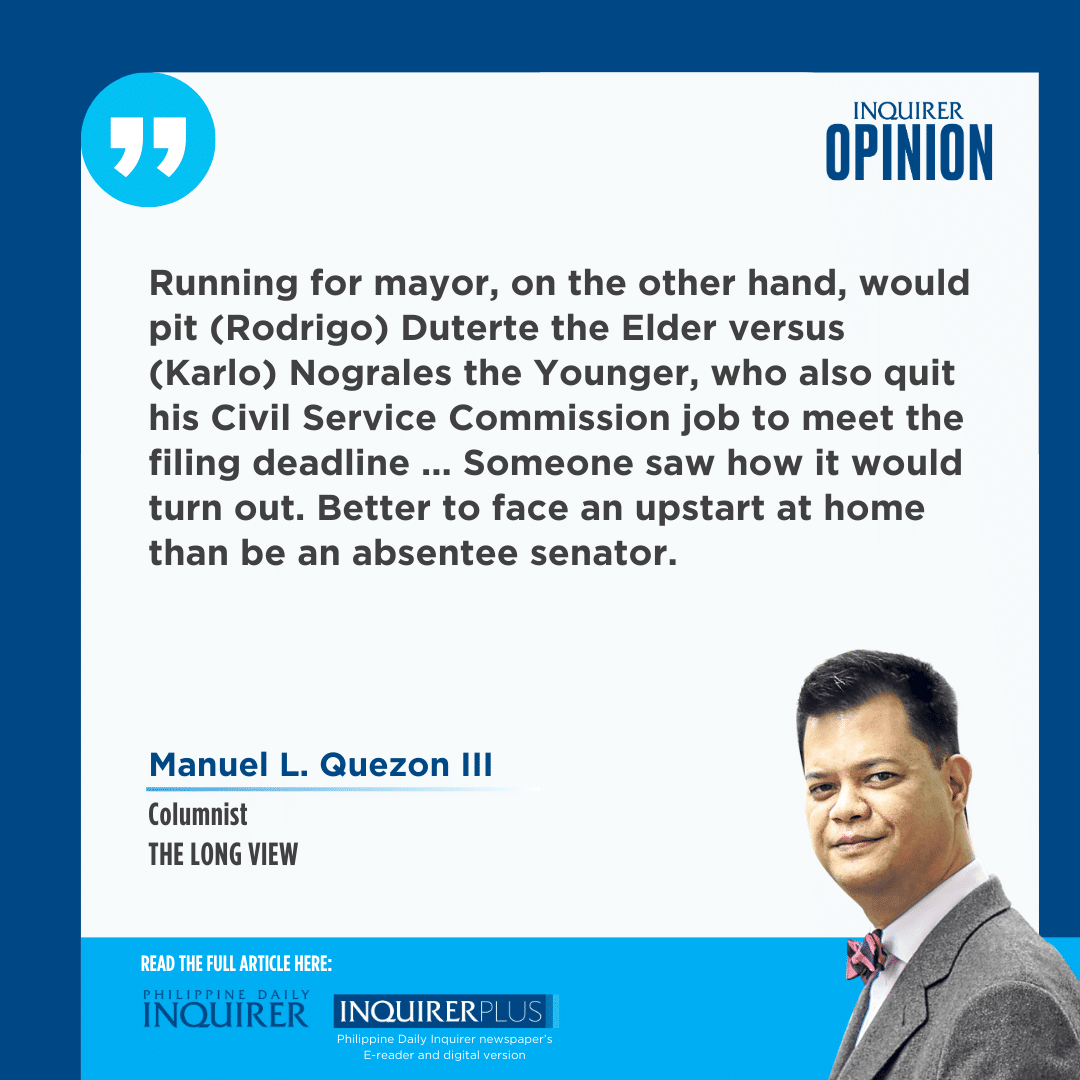The last charge of El Cid

Part of his political brand is pulling surprises, and in the end, he stayed true to form and provided a modest one. After shuffling forward to be photographed submitting his candidacy papers for the mayoralty of Davao City, a day later Rodrigo R. Duterte disavowed them and submitted the paperwork for a senatorial candidacy as well.
While the initial optics were unfavorable—for some reason, many were shocked by the former president’s appearance despite it being widely discussed he’d had a stroke—a Senate bid can be almost entirely waged by remote control; running for mayor, on the other hand, would pit (Rodrigo) Duterte the Elder versus (Karlo) Nograles the Younger, who also quit his Civil Service Commission job to meet the filing deadline. In what is widely—though morbidly—mentioned as Duterte’s final political battle, it seems the best location from which to fight it out is in Pasay, where the Senate currently holds its sessions.
It’s a kind of echo of the story of another Rodrigo, famously known as El Cid. The former president belongs to the generation that would have seen Charlton Heston play the role in 1961. According to legend, Rodrigo Diaz de Vivar, a knight, and warlord, took control of Valencia from the Moors and ruled it from 1094 to his death in 1099, but performed one more posthumous act of generalship when his wife ordered her husband’s corpse to be dressed in his armor and mounted on his famous horse, Babieca, to boost the morale of the troops when the Moors once again besieged the city. The mounted corpse of El Cid—for this was one of the titles of Rodrigo Diaz—won a tremendous victory, although by 1101, his wife had fled Valencia, bringing her husband’s corpse to Burgos: Valencia would be reconquered by the Moors by 1102.
Unlike the Tulfos, who now have two brothers running for the Senate at the same time (surely to form a bloc with their brother Raffy who is already in the Senate, and like their other brother Erwin and his nephew, Ralph, Senator Raffy’s son), the Dutertes seem to think only one out of the three names originally floated—the former president and his sons Baste and Paolo—is nationally viable: and the patriarch it is. There, at least, he can make up for the potential loss of Bato dela Rosa who isn’t sure of reelection. But other than that, he himself, as president, proved how insecure the Senate can be, as an institution when its members face persecution or prosecution.
A Senate with half of its membership divided between the senators of Tulfoland—assuming three brothers Tulfo—and the senators of the United Grand Duchies of Davao and Ilocos Norte—Duterte, Go, and Imee Marcos—and the other half being one-third Cayetano and the rest, the usual suspects, is one more likely to play ball with an administration that can reasonably expect to win a strong majority of Senate seats in this midterm. This is assuming the senatorial race at its starting point, based on averaging the credible survey firms (Social Weather Stations, Pulse Asia, OCTA Research, and WR Numero) provides a rough guide to expectations.
The polling average of the four as of last month, from highest to lowest in the top 14: Erwin Tulfo (56 percent), Ben Tuflo (46 percent), Tito Sotto (43 percent), Pia Cayetano (34 percent), Bong Revilla (33 percent), Bong Go (32 percent), Duterte (unreported), Ping Lacson (32 percent), Manny Pacquiao (29 percent), Imee Marcos (29 percent), Lito Lapid (25 percent), Abby Binay (25 percent), Bato dela Rosa (24 percent), Francis Tolentino (21 percent) with 30 percent being the minimum needed to win a Senate seat (Willie Ong 21 percent, Camille Villar 20 percent, Kiko Pangilinan 19 percent, and Benhur Abalos 19 percent are also viable candidates). Since the senatorial topnotcher in a midterm election is automatically considered a viable presidential contender, then by association, there would be more to reconcile the Marcoses to a Tulfo successor in case a Romualdez can’t manage it, than to otherwise face 2028 with no one to anoint if the Veep remains either in office or a contender.
Still, for now, one has to wonder if parking the former president in the Senate as a legislator (when, in his prime, he hardly attended sessions of the House) to spare him a humiliating battle against Karlo Nograles, merely postpones the inevitable. When he witnessed the charge of the British Light Brigade against massed Russian artillery, the French Gen. Pierre François Joseph Bosquet famously exclaimed, “It is magnificent, but it’s not war: it’s madness.”
In the end, Duterte’s former spokesperson Salvador Panelo denied it. Someone saw how it would turn out. Better to face an upstart at home than be an absentee senator.
Email: mlquezon3@gmail.com; Twitter: @mlq3
















